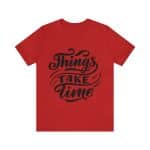“Mistakes are proof you’re trying” is a reassuring reminder that effort, even imperfect, is vital to growth and learning. Though its exact origin is unknown, this quote echoes the sentiments of many educators, psychologists, and motivational speakers who emphasize the value of persistence and resilience. It captures a fundamental truth in personal development: progress has its share of setbacks, and each mistake is a stepping stone toward mastery.
Historical figures and modern leaders have often discussed the importance of perseverance through failure. A classic example is Thomas Edison’s famous mindset about finding 10,000 ways that didn’t work before successfully inventing the light bulb. It’s not just about trying; it’s about learning and evolving through each attempt.
You may not be ready to fail ten thousand times. Chances are you won’t need to because your goals probably don’t involve inventing something. If you’re following a traditional objective you may only have to push through half a dozen or so obstacles. With the right mindset you won’t have any problem doing it.

Wisdom from the Whirlwind: Learning Through Mistakes
The first step to finding wisdom through mistakes is recognizing and accepting errors as natural outcomes when trying something new or challenging. Viewing mistakes through a lens of curiosity rather than judgment opens the door to self-improvement and innovation. For instance, a young entrepreneur might launch a product that doesn’t meet market expectations. Instead of viewing this as a failure, they can analyze customer feedback, understand the product’s shortcomings, and use this knowledge to refine their next offering.
Maintaining wisdom gained from mistakes requires a mindful approach to both personal and professional life. Cultivating an environment where you value continuous learning over perfection is crucial.
That can mean setting aside time for reflection after completing projects or tasks, seeking constructive feedback from peers, and being open to new methods or ideas that challenge conventional thinking. For example, a teacher who finds a new teaching method isn’t resonating with students might adapt their approach, turning a professional setback into a valuable learning experience.
Frequently Asked Questions: Navigating Your Path to Success
The first step is to acknowledge the mistake without harsh self-judgment. Reflect on what happened and identify the key lessons it teaches. Consider documenting these insights in a journal or discussing them with a mentor. This process turns a mistake into a learning opportunity and prepares you for more successful future endeavors.
Maintaining a positive attitude starts with changing your perspective on failure. View each failure as a stepping stone towards your goals. Regularly practice gratitude and mindfulness to keep your spirits high. Surrounding yourself with supportive individuals who encourage and motivate you can also significantly uplift your attitude.
Absolutely! Making mistakes and, more importantly, learning from them, demonstrates your willingness to take risks and adapt, which are highly valued traits in any professional setting. Each mistake provides insight into what doesn’t work, refining your approach and making you a more competent and resilient professional. Mistakes are proof you’re trying!
Implementing a structured reflection process can be incredibly beneficial. After a mistake, ask yourself: What went wrong? What could be done differently next time? Seek feedback from others to gain different perspectives. Additionally, setting up a ‘lessons learned’ session with yourself or your team after projects can help crystallize insights gained from errors.

From Starting to Stellar Success: Sustaining Growth
One must develop resilience and a positive mindset to translate lessons from mistakes into sustained success. That involves embracing challenges as opportunities to test one’s abilities and expand one’s skill set. Consider a writer who receives critical reviews on their first novel. By focusing on the constructive elements of the feedback, the writer can improve their storytelling skills, character development, and narrative pacing in future works, thereby turning initial disappointment into a driver of career development. Mistakes are proof you’re trying so never give up!
Another critical aspect is setting realistic, incremental goals for steady progress. Each goal achieved is a milestone that builds confidence and competence, reinforcing the belief that mistakes are inevitable and beneficial. For example, an athlete might not qualify for a competition, but by analyzing their performance and identifying areas for improvement, they can set targeted training goals. Over time, these small steps culminate in enhanced performance and success.
Stay healthy and positive. Those are two factors that always make achievement easier. If you feel good and have the energy to accomplish your goals you’ll get there. It’s only when you burn out or lose motivation that things get dicey.
Celebrating Every Step
“Mistakes are proof you’re trying” is a comforting aphorism and a powerful philosophy that champions the relentless pursuit of goals despite obstacles. It encourages an open-hearted approach to failure—not as a signal of defeat but as an essential ingredient in the recipe for success. By learning from each misstep and valuing the process over perfection, anyone can transform their errors into opportunities for growth and achievement. In embracing our imperfections, we pave the way for a future prosperous with wisdom and success.





